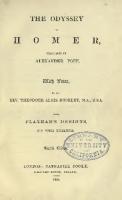The Reduction of ei to i in Homer 9781463221478
Herbert Weir Smyth focuses on a grammatical feature of the Homeric dialect of Greek viewed as an aberration by other gra
211 96 2MB
English Pages 32 [36] Year 2009
Recommend Papers

- Author / Uploaded
- Herbert Smyth
File loading please wait...
Citation preview
The Reduction of ei to i in Homer
A n a l e c t a Gorgiana
317 Series Editor George Kiraz
Analecta Gorgiana is a collection of long essays and
short
monographs which are consistently cited by modern scholars but previously difficult to find because of their original appearance in obscure publications. Carefully selected by a team of scholars based on their relevance to modern scholarship, these essays can now be fully utili2ed by scholars and proudly owned by libraries.
The Reduction of ei to i in Homer
Herbert Smyth
"ék
1 gorgias press 2009
Gorgias Press LLC, 180 Centennial Ave., Piscataway, NJ, 08854, USA www.gorgiaspress.com Copyright © 2009 by Gorgias Press LLC Originally published in All rights reserved under International and Pan-American Copyright Conventions. No part of this publication may be reproduced, stored in a retrieval system or transmitted in any form or by any means, electronic, mechanical, photocopying, recording, scanning or otherwise without the prior written permission of Gorgias Press LLC. 2009
1
ISBN 978-1-60724-549-0
ISSN 1935-6854
Extract from The American Journal of Philology, vol. 6 (1885).
Printed in the LTnited States of America
AMERICAN JOURNAL V O L . V I , 4.
OF
PHILOLOGY WHOLE
NO. 24.
I . — T H E R E D U C T I O N O F E I T O I IN H O M E R . From the fact that there is no great physiological dissimilarity between the diphthongal elements e and i, their combination in a diphthong kut' ¿ntKpdreuw (ei, ei) has not been able to maintain itself under all conditions, suffering a change, which, in the case of ei, is assumed to have taken place in the proethnic stage of the Indo-European languages. Johannes Schmidt ( K . Z. X X V I I 305) has attempted to prove that before a consonant or as a final sound, -ei was deprived of its weaker element, e standing as the representative of the compound (ras, Lat. res, from rei-\-s; locative -









